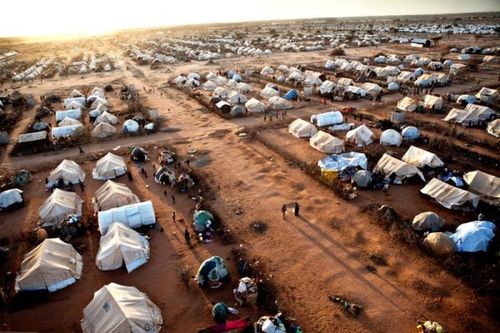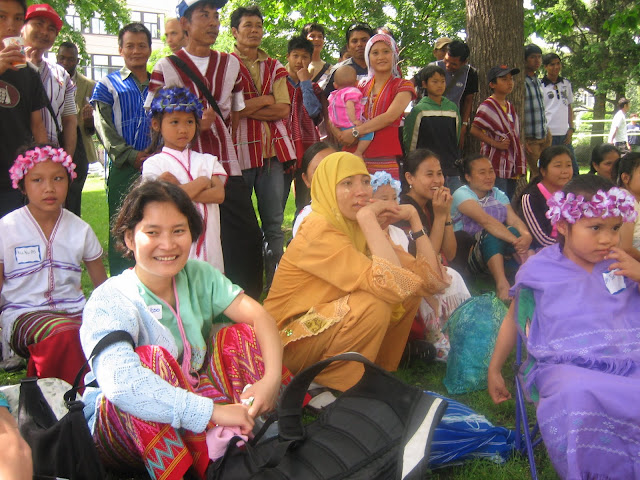It’s always wonderful to be home for the holidays. Indeed, holiday songs romanticize how sweet and touching such moments can be. “I’ll be home for Christmas, you can count on me. Please have snow and mistletoe and presents on the tree…”
But imagine being not just home for the holidays – but being in a strange land as well. In this topsy-turvy world, that’s a reality for many. Famine, war, civil unrest, genocide – all cause people to flee their homelands. The survivors end up in refugee camps where they can stay for years. Some are then relocated to new nations, where they have to learn new languages, adapt to cultures and develop new job skills.
The U.S. Committee for Refugees and Immigrants (USCRI) has been helping refugees make the transition to the United States for more than a century now. Founded in 1911, it is a national, nonprofit, non-governmental, nonsectarian, nonpartisan refugee resettlement and advocacy organization.
Its challenges only loom larger today. Because of the unrest in Syria, the number of worldwide refugees is predicted to be the highest so far this century. The estimated number: Some 42 million.
Part of USCRI’s mission is to help refugees achieve the American Dream: Find a home, land a job, get an education, raise their children safely, pursue happiness. It can be a daunting process, given the pain and suffering that these refugees have endured. But the agency has a long and distinguished history, helping people from all parts of the world, including Europe, Latin American, Asia, and Africa. It rallies communities, neighborhoods, and volunteers to help these people make this most difficult of transitions.
As a nation, we have a wonderful history of being a refuge for people who have had to leave their homeland due to civil wars and dangers they faced in confronting political wrongs. America as a safe harbor is a gift that keeps giving. It’s that reason, we are highlighting this month our diversity and how that expands the ways we celebrate. As we learn in the interview below with Jenelle Eli, Communications and Development Officer for USCRI, keeping holiday traditions is a vital part of this healing and transition process. These people have lost everything – but not the joyous fashions in which they celebrate their most important cultural moments.
Her fascinating insight continues below:
– – –
What is the process one goes though when they immigrate to the United States? What role does USCRI play in this process? When does your organization’s involvement begin and end?
Refugees are people who have fled their home countries due to persecution. Many have lived through war, genocide, trafficking, and gang violence before spending decades in refugee camps. Some refugees have the opportunity to rebuild their lives in a “third country” – that’s when USCRI and the U.S. Office of Refugee Resettlement steps in.
USCRI welcomes refugees to the United States, in every sense of the word. Our case managers and volunteers find and prepare apartments for refugees, stock their cupboards and refrigerators with culturally-appropriate food, and meet refugees as soon as they step off the plane. When refugees arrive at the airport, they are equal parts excited and disoriented – tired, hungry, and delighted that someone who speaks their language is waiting for them at the gate. They are often handed gloves and a winter jacket to wear because it’s snowing outside – something that is quite perplexing for a refugee from the hot climate of Burma!
For years after their arrival, we provide refugees with the tools and opportunities they need to become self-sufficient members of their new communities. We teach them English, enroll their children in school, and help them find their first jobs. Just as important as providing these basic services is our role in helping refugees to navigate the complexities of American culture, while respecting differences and encouraging them to maintain the cultural traditions that are important to them.
Your organization has helped untold numbers of refugees from around the world settle in the United States. We can only imagine the challenges they face, from gaining employment to having housing. But how important is maintaining cultural traditions, such as holiday celebrations?
Most refugees have spent decades in a state of transition. They’ve lost their homes, their family members, and every possession they’ve ever owned. Cultural traditions are the constant – the one thing that no oppressor could take away from them. Change is inevitable, but holiday celebrations are valuable tokens of home that are passed from generation to generation. A much-needed reminder of home, holiday celebrations come with all the tastes, smells, and sounds of their birthplace.
Given all the challenges, is maintaining holiday traditions something people new to our nation might not have the time or wherewithal to focus on?
Recently-arrived refugees learn something new every minute: how to change a light bulb, where to catch the bus on their way to work, and how to keep up with their child’s new obsession with Dora the Explorer. Luckily, when refugees arrive in the United States, they settle down near others from similar cultures and traditions. This proximity – both geographic and emotional – enables refugees to maintain holiday traditions together. Just like at home, some families and individuals take charge of organizing the celebrations and everyone contributes to the food, entertainment, and soul of the holiday.
Our nation’s way of celebrating Christmas has to be a bit overwhelming. (Stores start putting out displays after Halloween!) What kind of reaction has your organization seen from people new to our nation when it comes to Christmas?
A common response from refugees is that they love the holiday lights! Despite being of different religions, many of our refugees are enthusiastic about celebrating relatively secular traditions of the holiday season. Recently, a Muslim refugee family from Iraq took a field trip to cut down a Christmas tree with a community volunteer. They drank hot chocolate, picked out a tree, and decorated it together. Refugees are eager to learn about all aspects of American life – taking part in holiday traditions is an interactive way to learn about their new home. USCRI is a secular organization, so we are committed to helping refugees maintain both the religious and non-religious traditions that are important to them.
Of course, many cultures celebrate Christmas or a winter holiday. Is there any particularly celebration that you find to be particularly inspiring? If so, how?
Along with the onset of cold weather, many Bhutanese refugees celebrate Dashain and Diwali. The days-long celebrations include the lighting of candles, singing, dancing, and delicious food. The entire refugee community comes together to revel in the positivity of the future. They welcome neighbors and friends, no matter their religion. Despite facing hardships in the past, it’s inspiring to see the enthusiasm and hope displayed by refugees during their holiday celebrations.
One of the great things about our nation is our ability to absorb people from new lands. It’s a hallmark of our nation. Another hallmark is that people become, well, “Americanized.” Over time and generations, they lose some of their culture. (They shop in malls, eat fast food, speak only English…) Some believe it’s a good thing. Others worry that we lose a bit of what makes us special. What do you think? Does it have to be either/or?
From my experience, the resettled refugees who truly thrive are those who find a balance between their own cultural traditions and this new life in the United States. They pick and choose their favorite aspects of both cultures and are able to create a unique path for themselves and their families. It’s this fusion of customs and backgrounds that makes America such an exciting and awe-inspiring place to make a life.
What traditions have you learned about in your position with USCRI?
I’ve been lucky enough to celebrate holidays with refugees from Burma, Bhutan, Somalia, Iraq, the Democratic Republic of Congo, Burundi, and other cultures. What strikes me is each community’s tendency for inclusiveness. They are always eager to share their traditions with people who are interested in learning. My favorite commonality is people’s desire to share unique and delicious food at their holiday celebrations! Refugees relay their history, their hopes, and their openness through cooking and eating – personally, that’s my favorite way to learn about people’s cultural traditions.
– – –
Thank you Ms. Eli for participating and we applaud your organization for doing such valuable work. Learning about the plight of refugees should help all of us appreciate the many gifts we have this holiday season.
Mike Stetz, Senior Writer
Collaborative Services, Inc.






Recent Comments